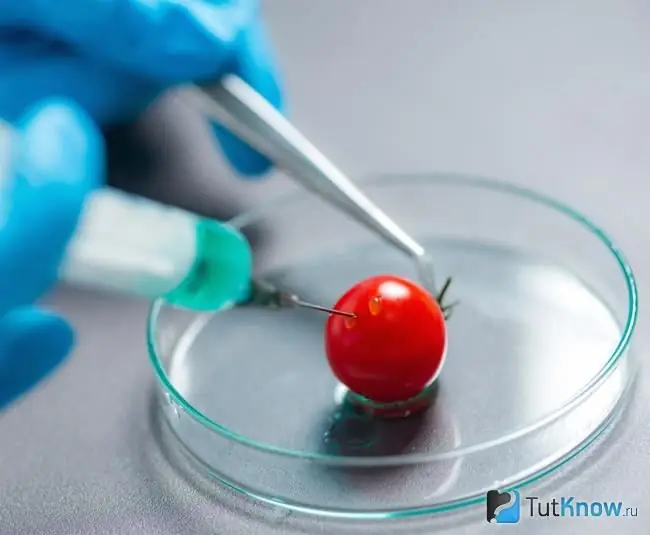- Author Arianna Cook cook@women-community.com.
- Public 2024-01-12 17:55.
- Last modified 2025-01-23 09:40.
What are the myths about nutrition and diets, how true are they? The most famous misconceptions about losing weight.
Myths about nutrition are deeply rooted in the heads of those who are losing weight, although they have no scientific basis. Despite the fact that all of them have long been disproved by scientists, magical diets, fat-burning foods and miraculous practices continue to appear in the articles. Unfortunately, such advice is not only useless in essence, but also harmful to health. We have collected for you TOP 15 nutritional myths that will help you figure out how to lose weight correctly and healthily.
The harm of GMOs

Nutritional myths include many natural food misconceptions. One of the most common is the harm of GMOs. It is widely accepted to demonize genetically modified products, because they seem to be artificial.
In fact, GMOs are nothing more than conventional breeding, that is, the choice of better quality products. Only if earlier people simply selected good fruits, in modern times it is possible to select improved genes.
Despite the fact that studies proving the harm of GMOs have long been refuted, since they were carried out of poor quality, the myth about the dangers of such products still lives on.
Fractional nutrition to speed up metabolism
In the minds of people, there are several persistent myths about fractional nutrition. The most popular of them is that in this way you can speed up your metabolism. In fact, almost nothing affects metabolic rate, frequency and type of food as precisely. The most optimal diet for a person is three meals a day, with or without snacks. If you feel hungry - have a snack, if you do not feel - great.
Another myth is that fractional meals will prevent the stomach from stretching, which means that the feeling of hunger will be less. There is a partial truth here. The stomach really has the property of stretching, but it also has the property of contracting. A tight stomach is actually easier to satiate, so it's best not to overeat.
The next myth: fractional nutrition normalizes the gastrointestinal tract and prevents its diseases. In fact, with such a regime, we only exacerbate the situation. The digestive system takes time for enzymes to build up, and frequent meals can strain the liver.
Important! Fractional food - food is exclusively medicinal and is intended for people with health problems.
Proper nutrition for weight loss
Another myth about good nutrition is that it helps you lose weight. Unexpected, right? In fact, there is a completely different idea behind the concept of proper nutrition. A healthy diet is designed to improve the condition of the body by providing it with all the macronutrients and vitamins it needs.
Of course, calorie counting is also part of the system of proper nutrition - the only guarantee of weight loss. After all, if we eat uncontrollably, it is impossible to understand why we are gaining weight. By counting calories, you can eat just about anything and still lose weight. Proper nutrition is designed to make the body healthy.
Good to know! Weight loss articles love to demonize bananas. Yes, indeed, banana is quite high in calories, but it contains a lot of useful substances. Therefore, you can use it in cooking. Carefully.
Negative calorie foods

This phrase for the ears of a losing weight sounds like a fairy tale: you can eat and not get fat, but, on the contrary, lose weight!
The principle of negative calories, according to its advocates, works like this: a certain food, such as spinach, requires a lot of energy to digest. That is, you can eat 100 g of spinach, get 23 kcal, and burn 2-3 times more!
Unfortunately, this is just another myth about nutrition and dieting. No product can require more energy than it provides itself. So eating a piece of cake and then a spinach salad, hoping that it will burn up the calories from the cake, will not work.
But there are low-calorie foods: spinach, cucumbers, apples - in general, many vegetables, fruits and berries. It is quite possible to have a snack with them between main meals when you feel hungry. Usually low-calorie foods are quite bulky, so they fill the stomach and feel full.
The benefits of separate nutrition
The essence of separate nutrition is that when you eat everything at once, the food in the stomach is processed more slowly. This, according to the creator of the system, Herbert Shelton, can provoke fermentation and putrefaction of food in the body. After the intoxication of the body will begin. How true is this theory?
According to her, the stomach works in different ways at different times, preparing enzymes for the digestion of proteins, fats or carbohydrates. But in reality, things are a little different. There are different sections of the digestive tract for the digestion of different nutrients, which is confirmed by research, which means there are no obstacles for the proper functioning of enzymes. Problems with food digestion indicate the presence of a disease.
In addition, the very idea of separate processing of nutrients is absurd, because there are no pure proteins, pure fats and pure carbohydrates. For example, meat contains both proteins and fats, and cereals, in addition to carbohydrates, also contain vegetable proteins. So you shouldn't fall for the beauty of nutritional myths.
Note! Separated meals can cause depression. The fact is that the hormone of happiness, serotonin, can only be produced with a mixed diet.
The benefits of fasting for the body
The theory of fasting is also included in the myths about weight loss and dieting. You can often hear that hunger in certain doses is good for the body. With intermittent fasting, for example, the diet is as follows: you can eat one day, but not the second.
But no research has confirmed the benefits of such a system, but on the contrary, the harm. A person needs a certain set of macronutrients and energy every day, and fasting only interferes with his work.
Useful and unhealthy foods

One of the most famous myths about food is that they are all divided into healthy and unhealthy. This definition is fundamentally wrong. In fact, those foods that simply do not bring benefit are called harmful. They cause harm to the body when consumed in excess, when there are no dishes in the diet, from which the body will receive the daily norm of nutrients and vitamins.
Enemy # 1 is considered by many to be palm oil, which becomes trans fat when processed. Trans fats are really bad, but again, in excess. Don't eat too much margarine and other solid palm oil products and you should be fine.
It is also advised to avoid fried foods. Why is she so scary? In fact, the frying itself is not terrible. For example, food can be cooked in burnt oil, and there will be no benefit from it, but carcinogens and fat will remain, and the oil is very, very high in calories. Additional calories are added to the dish by sauces and seasonings, so they also need to be taken into account in the daily calorie intake.
What about carcinogens? They are a dime a dozen around us, and you can get neurosis by controlling your diet and defining each time a new product listed as carcinogenic. You should only take into account those that are especially dangerous. For weight loss, for example, burnt food is dangerous because it contains more calories.
Detox for unloading and weight loss
Detoxification of the body has been a very popular topic for several decades. But is there even a particle of truth in this concept? Here are some myths about detoxifying weight loss:
- Weight loss … Detoxification of the body is not able to burn body fat. Various detox diets are most often aimed at getting rid of water, which will immediately return with the use of carbohydrates.
- Benefit … It is said that the consumption of freshly squeezed vegetable and fruit juices brings great benefits to the body. In fact, when squeezing juice, a lot of useful substances are lost and, in fact, sugar remains.
- Unloading … The most popular myth is the removal of toxins and toxins from the body. Often here we mean some kind of mythical toxins, because not a single smoothie will remove the real ones, and in general, intoxication is hard not to notice - it will become bad. And, of course, fasting days will harm the body more than restore it, because this is practically starvation.
- A burst of energy … Yes, on fasting days there is a feeling of lightness, but when fasting, this is a common practice. Soon it will disappear and there will be severe discomfort due to lack of energy and macronutrients.
A gluten-free diet to improve bowel function
A gluten-free diet is one of the most popular options for losing weight. It is generally accepted that gluten, gluten, inhibits the work of the intestines and generally increases the likelihood of weight gain. It is worth figuring out what is true in this diet and what is myth.
Yes, a gluten-free diet is beneficial, but only for those who are allergic to gluten. There are only 1% of such people on the entire Earth - is it worth it to bother unnecessarily?
In addition, losing weight on a gluten-free diet can completely harm the body. Wanting to quickly lose weight, a person begins to refuse all products with gluten, leads a strict diet, avoiding those dishes that he needs. In this case, the consequences cannot be avoided.
Low-carb diets for quick weight loss

It is believed that reducing carbohydrates in the diet leads to rapid weight loss within a few days. This is true, but there is a small catch - the insidious myth of low-carb diets.
The fact is that the kilograms leaving in the first days of losing weight are not at all a fat layer, it is water. Yes, the water retained in the body makes us fuller, but carbohydrates are not at all to blame for its delay. As soon as they return to the diet, because without carbohydrate food a person simply cannot survive, the water will return with them.
What actually affects water retention in the body? Salt. Excessive amounts of it can form edema on the body, which we mistake for fat. You can remove them simply by reducing the amount of salt in the dishes.
Where are myths and reality in nutrition? You shouldn't hate carbohydrates: the human body really needs them. The main thing is to choose the "right" ones. For example, simple carbohydrates - baked goods, starchy foods - do not create the proper feeling of satiety, but they form a healthy body fat. So the buns in the diet are really best cut.
Even those who are losing weight like to complain about the glycemic index. They say that carbohydrates increase blood sugar, and hence the body fat. But in reality, it is not sugar that affects fat deposits, but insulin. Therefore, those seeking to gain weight are better off paying attention to the insulin index of the product, and leaving the glycemic index for diabetics.
No meals after 18.00
Now it's time to figure out where the truth is, and where the myth is and is it possible to lose weight if you eat after 18.00. Everyone who loses weight knows: you need to eat more in the morning, and in the evening it is better to cook a smaller dish. And food for the night is strictly prohibited!
It is worth saying that there is indeed a difference between morning and evening meals, but it is so insignificant that it is not necessary to complicate your life with a strict eating schedule. This myth arose on the basis of a person's biological clock, they say, from morning to evening, the body works actively, and by nightfall its functioning slows down, which means that much more fat is deposited.
But let's try to look at it sensibly: how then should people who work the night shift be? So they are meant to be fat? And those who live in the North lay fat all the polar night?
Of course not. Human biorhythms have nothing to do with nutrition. But he does tend to gain weight if he eats at night. Why is that? Because usually, such night snacks are quite high in calories. At night we do not eat vegetable salads or yoghurts, we prefer our favorite treats and sweets, because they contain a lot of calories and make us more cheerful. So if you don't want to gain weight, just refrain from high-calorie goodies.
Good to know! Nutritionists recommend that you take your last meal 2 hours before bedtime. This is not due to the storage of fat, but to a better quality of sleep. The energy received from food will make the body feel more invigorated, and it will be more difficult to fall asleep.
Water to speed up metabolism
One of the most popular myths about healthy eating is associated with drinking a lot of water. Various sources recommend drinking 2 liters of water per day or more.
In fact, this is real masochism. Water comes to our body in a huge amount from various products, and it is absolutely not necessary to drink additional clean water. The body itself will tell you when it needs water, and thirst will arise.
At this point, it is really better to drink clean water, rather than tea or coffee. And gagging with a glass of water every hour in the absence of the desire to drink is not necessary.
There is also a misconception that drinking water speeds up metabolism, but no evidence has been found for this.
Metabolism boosting foods

Let's continue debunking the myths about metabolism. We have already figured out that neither water nor fractional nutrition can affect metabolism. What other legends are there about this process in the body?
Reading often about different diets, we see the phrase "speeds up the metabolism." You shouldn't believe it so easily. No product is able to speed up metabolism. Yes, coffee or hot peppers can disperse it, but this period is so short and has no effect on the process as a whole.
They say that at different times of the day and night, the metabolism works at different rates. This is indeed the case. Sleep deprivation makes it worse, so people with insomnia may gain weight. In addition, with a lack of sleep, you want to get additional energy and invigorate, and a person is inclined to eat more high-calorie foods, saturated with carbohydrates.
In addition, metabolism slows down with age, as the body requires less energy. Therefore, you need to increase physical activity.
Important! Pharmacies may sell a variety of biological supplements that supposedly speed up the metabolism. We recommend that you refrain from such a purchase, since there will definitely not be an effect from it, but you can cause very real harm to the body.
Sports nutrition and exercise for weight loss
Myths about sports nutrition and physical activity are also common among those who are losing weight. It is believed that exercising helps you burn a lot of calories, and you can eat anything and lose weight. This is only partly true.
Sports really contribute to weight loss, cardio training burns several hundred calories, but physical activity alone will not work. Weight is lost mainly by reducing the number of calories. If you do not control the energy entering the body, sports activities can be useless.
By the way, only cardio training and running really help to lose weight. Strength training, abdominal exercises, hips and so on are aimed at pumping muscles, but not at losing weight. Although we may feel like we have expended a lot of energy, calories are not burned as much as, for example, jumping. So if with the help of sports you only want to lose weight, and not build muscle, run a circle in the park or buy a rope.
As for sports nutrition, it is necessary only for athletes. Muscle building requires a small increase in protein in the diet, but for a person who does not exercise much, this can threaten an excess of protein.
Sugar as the main enemy of weight loss
Well, the last from the list of famous myths about weight loss is the demonization of sugar. It is pleasant to blame him for all the sins of those who are losing weight.
Indeed, sugar is pretty tricky. It acts on our body like a drug: the more we eat it, the more we want it. In addition, sweets are high in calories, and this is the real reason for weight gain - the excess of calories. In fact, you can not give up sweets at all, but it is quite difficult to control yourself while eating them. You can try to eliminate them gradually, reducing the amount of sugar - then you will get out of the habit of it and will be able to eat very little.
You can also see the use of honey instead of sugar on many menus. For some reason, it is believed that it is less caloric, but this is not at all the case. The beekeeping product contains even more calories, it just contains some useful substances. However, even therefore, you should not replace sugar with honey, because the same vitamins, amino acids and minerals are found in greater quantities in other products. The best substitute for sugar is a no-calorie sweetener.
Watch a video about weight loss myths:






